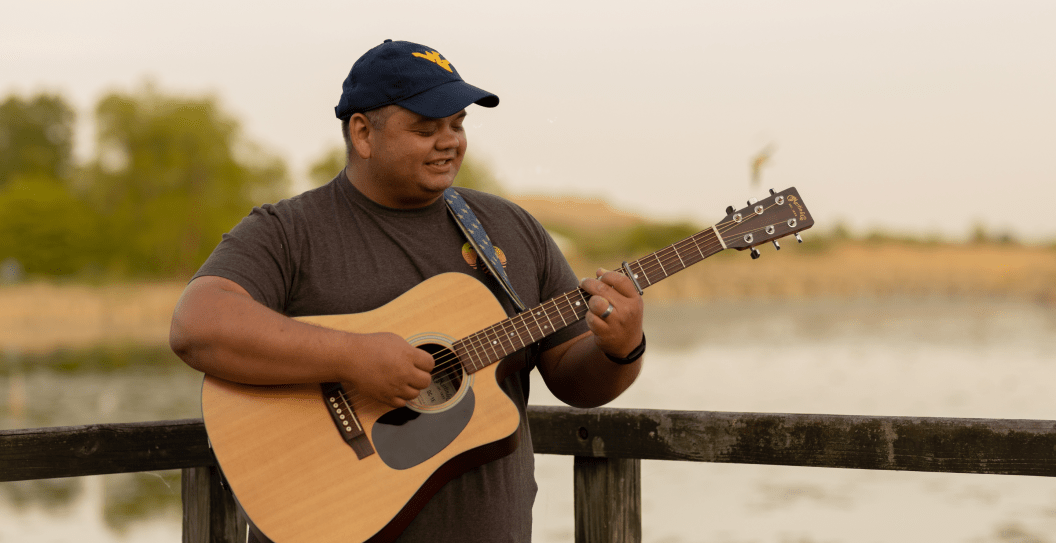Philip Bowen's debut album almost never happened. He was driving back from a Nashville music conference when he pulled over at a rest stop in Kentucky. Moved by what he'd seen in Music City, he made the decision right then and there to give music one more chance. He began writing again - eventually cooking up songs that would make Old Kanawha, out August 18.
"I made the decision to do it kind of independently," he tells Wide Open Country. "I had some good conversations to try to do it another way - but in the end, I really felt passionate about trying to get it done this way."
Bowen - who made waves on America's Got Talent after playing a violin rendition of System of a Down's "Chop Suey!" - nearly signed a recording deal to record this album in a Nashville studio. But the singer-songwriter wanted to capture the true Appalachian spirit. From session musicians to graphic designers and artists, the talent behind Old Kanawha is based entirely in the Appalachian mountains. With producer Zach McCord, he holed up in the McCord House Studios in Bridgeport. It might have taken a bit more ingenuity and travel to get everything locked and loaded, but the 13 tracks, including an acoustic version of "Anymore," were well worth it.
Across the record, Bowen celebrates West Virginia as much as he does depict the darkest parts of the state. "It was really important to me to be an authentic voice who had the experience of growing up there, whose family is there, who is there all the time, and who knows the people and what it's like to live there," he says. "I wanted to have this voice and tell the stories in a way that maybe people haven't heard before. There are so many artists from the area now that are doing these wonderful things. I think that it is helping to paint a better picture or a more complete picture versus cherry-picking one or two things that are easy to talk about in a headline."
What is most striking about the album is the connective tissue of time. Songs like "Trees Grow High," for example, find Bowen mulling over the relentless passing of time and how it affects his present. "So much of that has to do with the phase of life that you're in. One thing about the last decade is I had some really wonderful additions to my life, like my own children, for example," he says. "Just seeing the passage of time in that way and how sometimes it's very fast and slow and it's sad and happy. And then I also had some very significant losses in that window. In my childhood, I was fortunate I didn't have a lot of heavy family loss. But then it seemed like in that last decade, it was a series of losses. I was thinking about time in a whole different way and writing about it as part of my own life experience."
"There always seems to be some pain in store," Bowen sings in the heart-throbbing "Anymore," among the album's most emotionally galvanizing. In considering his life, he dives further into the unimaginable loss he's endured. "In a six-month period, both of my grandmothers passed away who I was very close to, and then a couple of years later, my grandfather passed away," he shares. "In between that, I had some different other family things happen and some family trauma and stuff like that. And I had a friend who took his own life after a long struggle with some things. It was just crazy to me that it seemed like it was happening at such a rapid pace compared to what I had experienced before."
The opening line, in particular, carries with it an immensely fresh kind of pain. "I wear a gold watch handed down from my grandpa," he sings. "I've been blue 'cause it stopped telling time a week ago." He takes a moment to explain why that lyric still stings. "[The watch] is the only thing I have of my grandfathers. I had it on my desk. So, one day I was writing another song, and I saw it stop working and it just hit me so differently. It felt like he was well and truly gone."
Elsewhere, Bowen delves into addiction with companion songs "Vampire in Appalachian" (featuring Josiah and the Bonnevilles) and "A Murder," the latter which takes on the perspective "of somebody who's dealing with active addiction," he says.
"Both of those songs, I had a lot of trouble finishing them because it's just harder subject matters to tackle. I wanted to tell it the right way, and I wanted to do it the way I wanted to do it and come across as genuine," he continues. "I am somebody who normally is pretty upbeat. My grandma used to tease me that I was a glass-three-quarters-full kind of person. Sometimes I don't talk about the harder stuff, but music is where I really deal with it."
"I woke up a little early to watch a murder... of crows," sings Bowen. He upends lyrical expectations to make way for the powerful imagery of crows to carry the song. "This person I've known my whole life was going through this cycle of addiction, and we were talking. He told me, 'Man, I just feel like this thing is absolutely murdering me.' That really stuck with me. I never lost that. It was the winter time in Michigan, kind of where I am now. And I was reading about the crows and how they treat each other and stuff like that and how sometimes they'll kill each other off. I was playing with this idea of a murder of crows and using the wordplay there. And usually, you associate that kind of black bird with lonely imagery."
From lighter fare like "Better Together (Cora's Song)" to another timepiece "Stella," Old Kanawha finds Bowen staking his claim. Bowen, who draws upon such influences as The Milk Carton Kids and Watchhouse (formerly Mandolin Orange), makes an impressive statement not only about West Virginia but the human experience. It's equal parts bitter and sweet - and 13 songs captures both quite perfectly.




